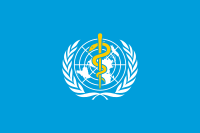
Photo from wikipedia
Introduction Supporting medical students’ and junior doctors’ development in busy clinical settings is challenging. As opportunities for developing trainees, for example, traditional bedside teaching, are decreasing, teaching outside of clinical… Click to show full abstract
Introduction Supporting medical students’ and junior doctors’ development in busy clinical settings is challenging. As opportunities for developing trainees, for example, traditional bedside teaching, are decreasing, teaching outside of clinical practice is increasing. However, evidence suggests that effective learning through practice arises via an interplay between, first, what experiences are afforded by clinical settings and, second, how trainees engage with these affordances. Many studies investigating clinician learning through practice focus on only one of these two factors. Yet, a well-recognised methodological challenge of enabling learners to articulate how and what they are learning through practice exists. We need, therefore, to understand how this relationship plays out in practice in ways that enrich learning. Methods and analysis This protocol describes a video reflexive ethnographic approach to illuminate how learning through practice in hospital settings occurs and can be enriched. The study will be conducted in two phases. In phase I, senior clinicians from emergency medicine, medicine and surgical specialties will be interviewed about how they guide trainees’ learning through practice. These forms of guidance, analysed using the framework method, will inform phase II comprising observations of practice in: (1) emergency, (2) medical and (3) surgical departments. Video recorded episodes of clinicians’ guiding learning through practice will be shared and appraised in reflexive sessions with each clinical team. Relational interdependent learning theory informs the design and data analyses to elicit and evaluate strategies for guiding learning through practice. Ethics and dissemination Ethical approval has been received from both healthcare and university settings. The findings should provide important insights for clinicians about workplace learning practices. Findings will be disseminated across the project phases and to diverse audiences—locally, nationally and internationally. The dissemination strategy will use seminars, grand rounds, conference presentations and academic papers to articulate practical, theoretical and methodological findings.
Journal Title: BMJ Open
Year Published: 2019
Link to full text (if available)
Share on Social Media: Sign Up to like & get
recommendations!